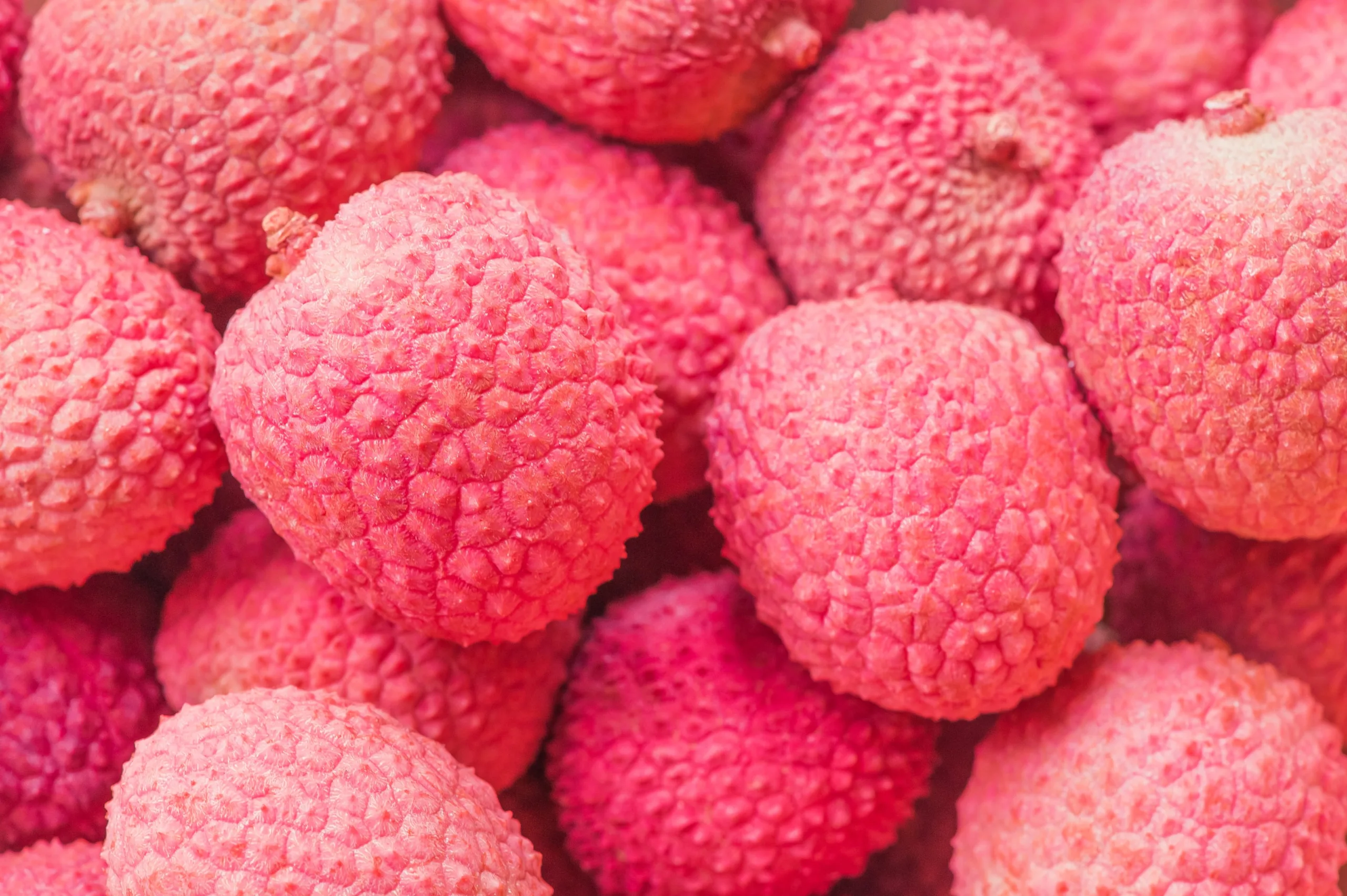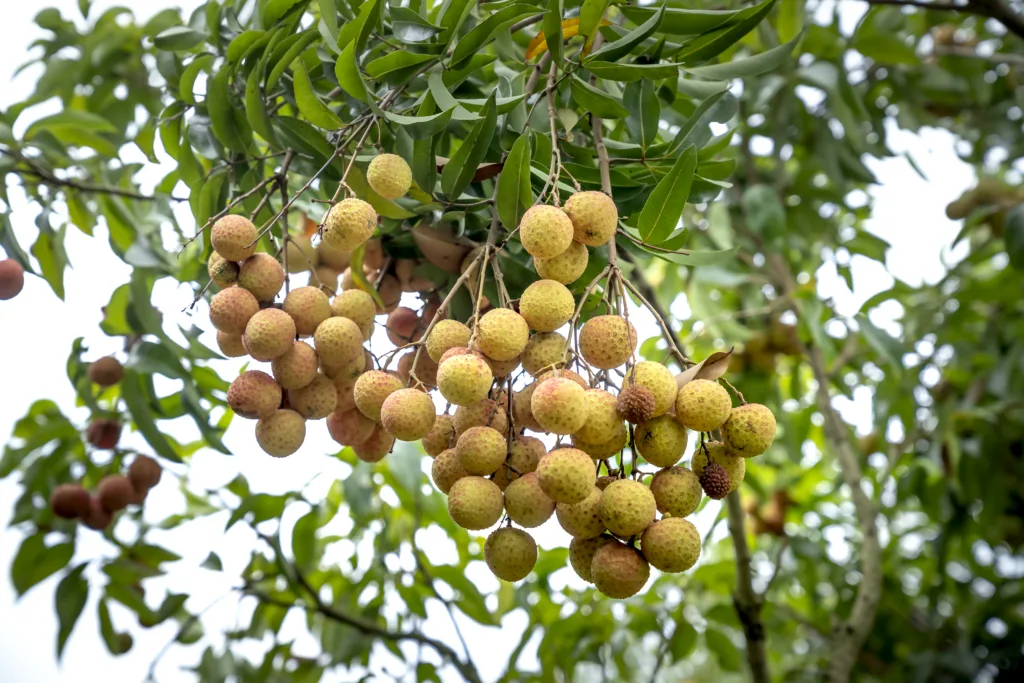Is Lychee Low FODMAP?
If you suffer from irritable bowel syndrome (IBS) and have to follow a low FODMAP diet, you may be wondering if lychee is a safe fruit to eat. Lychee has a unique sweet-sour flavor and is often used in desserts and savory dishes around the world. But is it part of a healthy, low FODMAP diet? This article will answer that question and explain why it’s important for those with IBS to know the answers.
Lychee is a tropical fruit with a sweet flavor and a fragrant aroma. It has a pink, bumpy outer skin with white, juicy flesh and a large, inedible seed inside. Lychee is native to Southeast Asia and is popularly eaten fresh, canned, or dried. It can also be used to make juices, jams, and other desserts.
Is Lychee Low FODMAP?
Lychees are a delicious tropical fruit, but they can also be tricky when it comes to following a low FODMAP diet. The good news is that lychees are low FODMAP in servings of up to 10-14, which is considered a ‘moderate’ serving size. It’s important to note that any more than this can cause symptoms in those with IBS. As with any food, it’s best to check with your doctor or dietitian before adding lychees into your diet.
When looking for fresh lychees, you should be able to find them in most supermarkets and Asian grocery stores. If you’re looking for canned lychees, make sure to check the ingredients list for added sweeteners or preservatives that may contain high FODMAP ingredients.
Overall, lychees are a great addition to your low FODMAP diet if consumed in moderation. Enjoy them as an occasional snack or use them in recipes like stir-fries and salads!
Lychee and IBS Symptoms
Lychee is a tropical fruit that has been linked to a variety of health benefits, including the potential to reduce symptoms associated with irritable bowel syndrome (IBS). While more research is needed to determine whether lychee can significantly improve IBS symptoms, some studies have found that it may have beneficial effects.
One study found that daily consumption of lychee pulp was associated with improved digestion and reduced abdominal pain in people with IBS. Additionally, the study found that people who consumed lychee reported feeling less full after meals and experienced fewer episodes of constipation. Another study found that lychee extract may help reduce inflammation in the gut and improve gastrointestinal function in people with IBS.
Other potential health benefits of lychee include increased immunity, improved heart health, reduced risk of cancer, and improved brain function. Lychee is also high in fiber, which can help promote regular digestion and reduce symptoms of constipation or diarrhea. In addition to its potential benefits for IBS symptoms, lychee is a tasty addition to many dishes and snacks.
Click here to preview your posts with PRO themes ››
In conclusion, while more research is needed to determine the full impact of lychee on IBS symptoms, some studies suggest that it may be beneficial for those who suffer from this condition. Lychee not only offers potential health benefits but also adds flavor to many dishes and snacks.
Nutritional Benefits of Lychee
Lychee is a popular tropical fruit with a unique sweet-tart flavor and a floral aroma. It is highly nutritious, containing an impressive array of essential vitamins, minerals, and antioxidants. Not only is lychee delicious, but it also offers numerous health benefits. Its high content of vitamin C and other antioxidants makes it an excellent source of nutrition.
One serving of lychee provides about 50% of the daily recommended value for vitamin C, which helps to protect the body from disease and infections. Vitamin C is also important for healthy skin, bones, and teeth. Additionally, lychee contains other antioxidants such as polyphenols that can help fight free radicals in the body.
Lychee contains several minerals that are essential for good health including calcium, magnesium, phosphorus, potassium, iron, zinc and copper. These minerals help to support strong bones and teeth as well as regulate blood pressure levels. Lychee also contains dietary fiber which helps to promote digestion and regularity.
Lychee is low in calories but still provides a good source of energy due to its natural sugars such as fructose and glucose. It also contains compounds such as quercetin that can help reduce inflammation in the body while promoting heart health.
Overall, lychee is an excellent addition to any diet due to its impressive nutritional profile. It not only tastes great but offers numerous health benefits as well.
Incorporating Lychee Into Your Diet
Lychee is an incredibly tasty and nutritious fruit, native to Southeast Asia. It’s high in antioxidants, fiber, and vitamins like vitamin C. Lychee can be enjoyed on its own as a snack or used in a variety of dishes for added flavor and nutrition. Here are some ways to incorporate lychee into your diet.
One of the simplest ways to enjoy lychee is as a snack. The fruit has a sweet flavor and can be eaten on its own or with other fruits. You can also add lychee to your favorite trail mix or yogurt for a nutritious snack.
Another great way to enjoy lychee is by adding it to smoothies or juices. The sweetness of the fruit pairs well with other fruits and vegetables for delicious, nutritious drinks. Lychee can also be used in salads for added flavor and texture.
You can also use lychee as an ingredient in sauces, such as chutneys and salsas. For example, you can make a spicy mango-lychee salsa that pairs perfectly with fish or chicken dishes. Lychee is also great when cooked with pork or beef dishes for added flavor and sweetness.
Finally, you can bake with lychees! You can add them to muffins, breads, cakes, or pies for added sweetness and texture. You can even use them as part of the filling for tarts or pies for an extra special treat!
Click here to preview your posts with PRO themes ››
Lychees are an incredibly versatile fruit that are full of flavor and nutrition! By incorporating them into your diet in various ways, you can reap the many health benefits they offer while enjoying delicious snacks and meals at the same time!

Alternatives to Lychee
Lychee is a popular open source content management system (CMS) used by developers and webmasters to build and maintain websites. While Lychee offers a range of features, there are several other CMS options available on the market. Some of the alternatives to Lychee include WordPress, Joomla!, Drupal, Magento, and Shopify.
WordPress is a popular open source CMS that is widely used by developers and webmasters. It offers an easy-to-use interface with a wide range of features, including custom post types, custom taxonomies, custom fields, widgets and plugins. It also offers a wide array of themes and plugins for customization.
Joomla! is another open source CMS that is often used to create large-scale websites. It offers a range of features such as multi-lingual support, advanced search capabilities, dynamic content management system (CMS) capabilities and access control list (ACL) support. It also has an extensive library of extensions and templates for customization.
Drupal is another popular open source CMS that offers users the ability to create complex sites with ease. It has a powerful core set of modules that offer users the flexibility to create sites with complex functionality such as user permission systems, multilingual support, customizable content types and flexible taxonomy systems.
Magento is an eCommerce platform that is used by businesses around the world to create online stores. It provides users with powerful tools for managing their online stores such as product catalogs, payment gateways integration, shipping integration and analytics dashboards.
Shopify is another eCommerce platform that provides users with an easy-to-use interface for creating online stores with minimal effort. It provides users with tools for managing their store such as inventory management systems, payment processing integrations and marketing tools such as email campaigns and social media integrations.
Are There Any Risks Associated With Eating Too Much Lychee?
Eating too much lychee can have some negative health effects. Consuming too much lychee can lead to stomach upset and digestive problems, such as diarrhea, abdominal pain, and nausea. The high amount of natural sugars found in lychees can also cause dental cavities and weight gain.
Lychees are also high in oxalates, which can lead to the formation of kidney stones if excessive amounts are consumed. Additionally, due to the high amount of fructose in lychees, eating too many may lead to symptoms of fructose intolerance, such as bloating, gas, abdominal pain and diarrhoea.
The consumption of lychee seeds is not recommended due to the potential for them to contain toxins that may cause liver damage if eaten in large amounts. Moreover, unripe or overripe lychees may contain a toxin called saponin which can cause vomiting and diarrhoea if ingested in high amounts.
Click here to preview your posts with PRO themes ››
Therefore, it is important to eat lychees in moderation and avoid eating unripe or overripe fruit. If you experience any unusual symptoms after consuming large amounts of lychees, it is best to seek medical advice immediately.
Is There an Appropriate Serving Size for People With IBS?
IBS, or irritable bowel syndrome, is a chronic digestive disorder that affects the large intestine. People living with IBS often experience symptoms such as abdominal pain, cramping, bloating, gas and changes in bowel movements. Eating the right amount of food can help manage these symptoms and improve overall health. But what is the appropriate serving size for people with IBS?
The answer to this question depends on a few factors, including individual health needs and dietary preferences. Generally speaking, people with IBS should aim to eat small meals throughout the day instead of three large ones. Eating smaller meals more frequently can help reduce the risk of abdominal pain and other digestive issues associated with IBS. It’s also important to avoid overeating as this can worsen symptoms like bloating and gas.
In addition to eating smaller meals more frequently, it’s also important to pay attention to portion sizes when it comes to carbohydrates and proteins. For carbohydrates, aim for a portion size that is roughly the size of your fist or half a cup in cooked form. For proteins, aim for about three ounces or the size of your palm per meal. As for fat intake, try to limit it to no more than two tablespoons per meal.
Finally, it’s important to stay hydrated by drinking plenty of fluids throughout the day. Aim for at least eight glasses of water per day and limit caffeine and alcohol intake as these can worsen IBS symptoms. Eating healthy snacks between meals can also help manage hunger and cravings while helping you stay on track with your meal plan.
In summary, there isn’t a one-size-fits-all approach when it comes to serving sizes for people with IBS; however, there are some general guidelines that can be followed in order to ensure that meals are balanced and nutritious while helping manage symptoms associated with this condition. Eating smaller meals more frequently throughout the day is recommended as well as paying attention to portion sizes when it comes to carbohydrates and proteins while limiting fat intake. Staying hydrated by drinking plenty of fluids throughout the day is also essential in managing IBS symptoms effectively.

Conclusion
Lychees are low FODMAP, but they should be consumed in moderation as part of a balanced diet. Lychees are high in fructose and can cause digestive issues if they are eaten in large quantities. Eating lychees in moderation can help people with IBS to improve their digestive health and reduce their symptoms.
It should also be noted that lychee is not recommended for people with fructose malabsorption, as it is high in fructose and can cause digestive issues. People with fructose malabsorption should avoid lychees or limit their intake to very small amounts.
Overall, lychees are generally considered a low FODMAP food and can be incorporated into a diet for those following the low FODMAP diet. However, it is important to remember to consume them in moderation and to keep an eye on other high-fructose foods that might be causing digestive issues.

